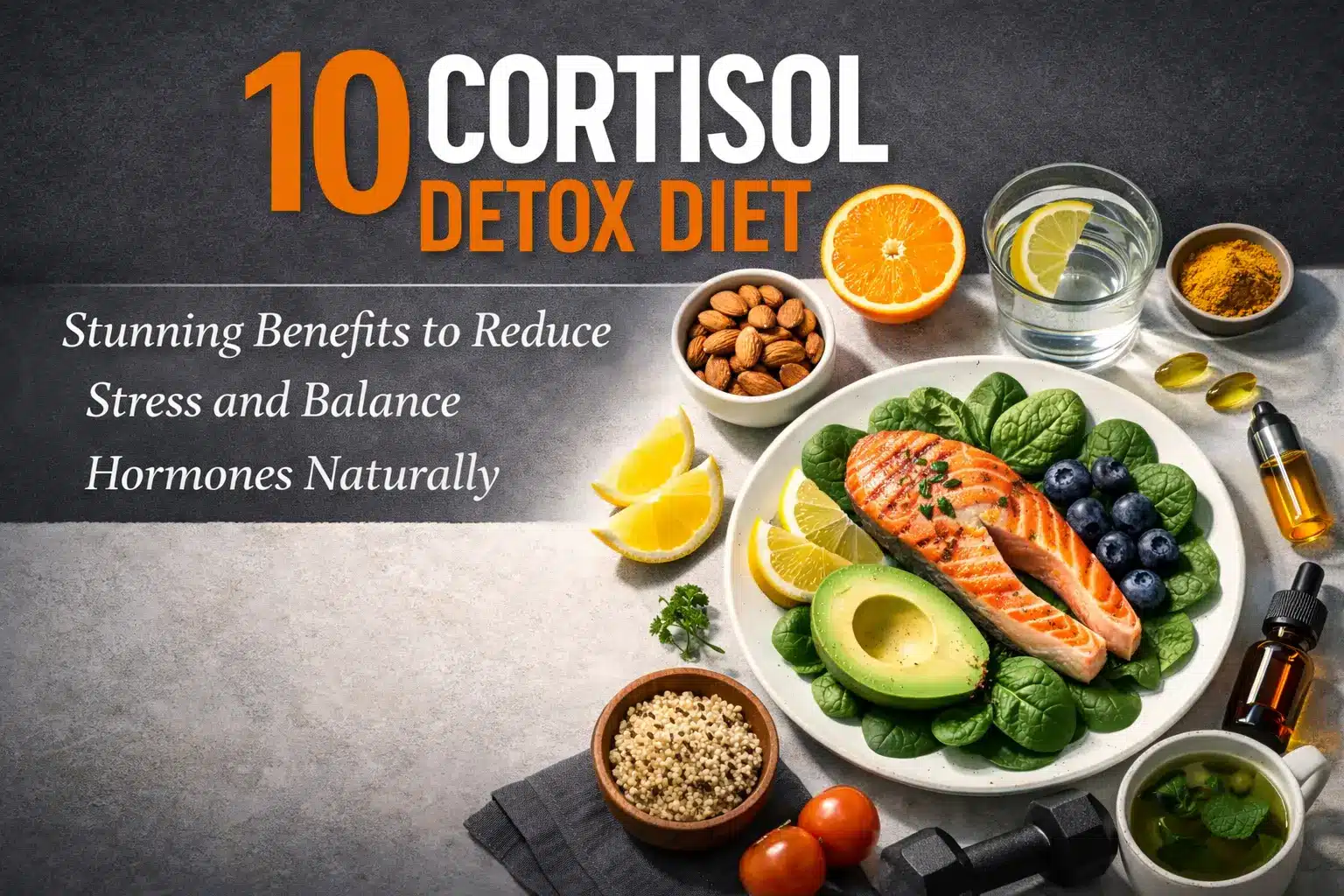Chronic stress is a modern-day epidemic, and its primary hormonal driver is cortisol. While essential in short bursts, sustained high cortisol can disrupt your metabolic health, sleep cycles, and mental well-being. The most effective way to combat this? A strategic dietary approach. A Cortisol Detox Diet, focused on functional foods, offers a powerful, natural solution to manage stress and promote hormonal balance.
In this post, we’ll explore the science of using nutrition for stress resilience. You’ll learn how specific foods, including adaptogenic herbs, gut-supporting probiotics, and healthy fats, directly influence cortisol production. We’ll provide a clear action plan, covering how BCAAs aid muscle recovery and how to structure meals for optimal blood sugar stability, so you can effectively lower cortisol levels and enhance your overall health holistically.
Why Managing Cortisol with Nutrition Matters
Impact on Health
Chronic, elevated cortisol does more than just make you feel stressed—it can systematically disrupt your well-being. When this hormone remains high over time, it often manifests as stubborn weight gain, sleep disturbances, heightened anxiety, and significant hormonal imbalances. Proactively managing cortisol through a targeted diet is a crucial strategy to prevent these adverse effects and protect your metabolic health.
Growing Focus on Functional Foods
The wellness landscape is evolving, with a clear shift from a singular focus on immunity to more comprehensive health concerns like blood sugar stability and hormonal balance. This has propelled functional foods into the spotlight. Key players such as gut-supporting probiotics, recovery-boosting BCAAs, and powerful adaptogenic herbs like Ashwagandha are gaining immense popularity for their scientifically-backed, stress-reducing properties and ability to support the gut-brain axis.
Sustainable Stress Management
Incorporating cortisol-lowering foods into your daily meals offers a sustainable and practical foundation for stress resilience. This holistic, food-first approach provides a powerful way to reduce reliance on external solutions, aligning with the growing consumer demand for natural and functional health solutions that promote long-term well-being.
What is Cortisol and Why Should You Manage It?
What is Cortisol?
Cortisol is a steroid hormone produced by the adrenal glands, which are located on top of your kidneys. Known as the primary stress hormone, it is released into the bloodstream during stressful situations, part of what is called the fight-or-flight response. Its role is to provide the body with a burst of energy to either confront or flee from perceived danger. This hormone works alongside adrenaline to regulate bodily functions in stressful moments, ensuring survival.
Cortisol’s Functions
Cortisol plays a crucial role in maintaining several essential bodily functions:
-
- Regulating metabolism: It helps convert proteins, fats, and carbohydrates into usable energy, influencing your energy levels throughout the day.
-
- Blood sugar management: Cortisol increases glucose levels to ensure energy availability, especially during stress.
-
- Sleep-wake cycle control: It follows a diurnal pattern, peaking in the morning to help you wake up and decreasing at night to promote sleep.
-
- Anti-inflammatory effects: Cortisol can reduce inflammation by suppressing immune system activity.
Effects of Elevated Cortisol Levels
Although cortisol is essential, chronic elevation of this hormone—due to prolonged stress, poor sleep, or an unhealthy lifestyle—can lead to several negative effects:
-
- Weight gain and increased belly fat: Elevated cortisol triggers cravings for high-calorie foods and promotes fat storage, especially around the abdomen.
-
- Sleep disruptions: High cortisol levels at night can interfere with deep sleep and result in insomnia.
-
- Increased anxiety and mood swings: Excess cortisol impacts the brain, reducing serotonin levels and making you more prone to anxiety, irritability, and depression.
-
- Weakened immune system: Chronic stress can suppress the immune response, making the body more vulnerable to infections.
Long-Term Risks of Unmanaged Cortisol
When cortisol remains elevated for extended periods, it can have long-term detrimental effects on both mental and physical health:
-
- Cardiovascular Health Risks: Chronic stress and persistently high cortisol levels are significant contributors to hypertension and an increased risk of heart disease. This state promotes systemic inflammation and can lead to arterial damage over time. Adopting a cortisol detox diet, rich in anti-inflammatory foods and antioxidants, can be a powerful strategy to help regulate stress hormones and support long-term cardiovascular wellness.
-
- Blood Sugar and Metabolic Balance: Excess cortisol is a key driver of insulin resistance, a foundational component of metabolic syndrome and type 2 diabetes. By naturally lowering cortisol through a diet focused on blood sugar stability—including fiber-rich and anti-inflammatory foods—you can help improve metabolic health and protect against these pervasive conditions.
-
- Brain Health and Cognitive Function: Prolonged exposure to high cortisol can negatively impact the hippocampus, the brain’s essential memory center. This can manifest as brain fog, cognitive decline, and an increased susceptibility to neurological conditions. Integrating brain-boosting nutrients like omega-3 fatty acids and flavonoids into your diet is crucial for protecting cognitive function, enhancing mental clarity, and supporting long-term brain health.
-
- Hormonal Balance and Well-Being: Cortisol doesn’t operate in a vacuum; an imbalance can disrupt the entire endocrine system, including thyroid function, estrogen, testosterone, and progesterone. This dysregulation often leads to fatigue, low libido, mood swings, and stubborn weight gain. A hormone-balancing diet, strategically incorporating adaptogenic herbs and healthy fats, is fundamental to restoring hormonal harmony and overall well-being.
Managing cortisol through diet, exercise, and stress reduction techniques is essential for long-term health. In the sections ahead, we’ll explore how functional foods can naturally lower cortisol levels and restore hormonal balance.
How Cortisol Detox Diet Works
The food you consume plays a direct role in how your body manages stress and regulates cortisol. Diets high in refined sugars and ultra-processed foods can cause rapid blood sugar spikes and crashes, forcing your body to release more cortisol to restore balance. Similarly, stimulants like excessive caffeine and alcohol can directly elevate cortisol production, further disrupting your hormonal ecosystem.
In contrast, a cortisol detox diet built on a foundation of whole foods provides the key to stability. Complex carbohydrates, lean proteins, and healthy fats work synergistically to promote blood sugar stability, preventing the sharp fluctuations that trigger a stress response. This nutritional approach supports a steady, healthy cortisol rhythm.
Your eating patterns are equally important. Prolonged fasting or skipping meals can be perceived by the body as a stressor, elevating cortisol as it signals for energy. By consistently nourishing your body with nutrient-dense, anti-inflammatory foods at regular intervals, you can actively lower cortisol levels, enhance your stress resilience, and promote a state of calm and balance.
Functional Foods: Probiotics, Adaptogens, and BCAAs
Functional foods go beyond basic nutrition, offering targeted benefits that can directly reduce stress, stabilize mood, and promote hormonal harmony. This section delves into three key categories of cortisol-lowering foods and how they work to support your body’s natural stress response.
Probiotics for Gut-Brain Axis Support
The connection between your gut and brain, known as the gut-brain axis, is a critical pathway in managing stress. Fermented foods like Greek yogurt, kimchi, sauerkraut, and kombucha are rich in probiotics that help nourish a healthy gut microbiome. Emerging research indicates that a balanced gut can directly contribute to lower cortisol levels, thereby helping to reduce anxiety and mitigate stress-related inflammation.
Adaptogens for Stress Resilience
Adaptogenic herbs are natural substances that help the body adapt to physical and mental stressors by regulating cortisol production. Key adaptogens like Ashwagandha, Rhodiola Rosea, and Reishi mushrooms have been shown in studies to significantly lower cortisol levels. Incorporating these herbs can lead to tangible improvements in sleep quality, mood stability, and overall mental resilience, making them a cornerstone of a cortisol detox diet.
BCAAs for Recovery and Metabolic Health
Branched-Chain Amino Acids (BCAAs)—leucine, isoleucine, and valine—play a vital role in muscle recovery and hormonal balance. By reducing exercise-induced stress and preventing the steep cortisol spikes that often follow intense workouts, BCAAs aid in more efficient recovery. Including BCAA-rich foods like eggs, lean meats, and plant-based proteins such as lentils and quinoa in your diet can support metabolic health and enhance your body’s ability to manage physical stress.
Scientific Basis: How Nutrition Impacts Hormone Regulation
A growing body of scientific evidence underscores the powerful role of targeted nutrition in regulating cortisol and promoting sustainable stress relief. Key studies highlight how specific nutrients and functional foods directly influence our stress response:
-
Magnesium for Calm and Sleep: A 2019 study in Nutrition Research demonstrated that diets high in magnesium-rich foods like leafy greens, nuts, and seeds were associated with significantly reduced cortisol levels and marked improvements in sleep quality.
-
Probiotics and the Gut-Brain Axis: Research, including a 2019 review in Frontiers in Neuroscience, confirms that consuming probiotic-rich fermented foods enhances gut-brain communication, leading to measurable reductions in anxiety and stress-related cortisol production.
-
The Power of Adaptogens: Clinical trials on Ashwagandha have shown impressive results. One study in the Indian Journal of Psychological Medicine reported that participants with chronic stress saw a reduction in cortisol levels by up to 30%, alongside improved mental resilience.
-
Omega-3s for Stress Buffering: Long-chain Omega-3 fatty acids, abundant in fatty fish like salmon and mackerel, have been consistently linked to a lowered cortisol response to acute psychological stress, as documented in a study by the American Journal of Clinical Nutrition.
By strategically incorporating these evidence-backed functional foods into your diet, you move beyond basic nourishment to actively optimize hormonal balance. This synergy between targeted nutrition and the body’s endocrine system highlights the profound power of food as medicine to naturally control cortisol and enhance overall well-being.
Avoid cortisol-triggering foods
-
- Refined Sugars and Carbs: High-sugar foods can cause blood sugar spikes, leading to increased cortisol.
-
- Caffeine: Excessive caffeine can disrupt sleep patterns, indirectly elevating cortisol.
-
- Processed Foods: Foods high in trans fats and preservatives can increase inflammation and stress levels.
-
- Alcohol: Heavy alcohol consumption can interfere with sleep and hormone balance.
Top Cortisol Diet-Foods That Lower Cortisol
The foods you consume play a crucial role in how your body manages cortisol production. Adopting a cortisol diet rich in nutrient-dense foods can effectively help regulate stress levels naturally. By focusing on foods with cortisol-lowering properties, you can promote relaxation and enhance your overall well-being. Here’s a list of some of the best foods known to reduce cortisol levels and support stress management.
Dark Chocolate

Dark chocolate is rich in antioxidants and flavonoids, compounds known to lower stress hormones. Studies suggest that consuming dark chocolate (70% cacao or higher) helps reduce cortisol levels by influencing the brain’s stress response. It Improves mood by boosting serotonin and dopamine levels.
Fermented Foods (e.g., Yogurt, Kimchi)

Fermented foods (Yogurt, kefir, sauerkraut, kimchi, and kombucha) contain probiotics, beneficial bacteria that promote gut health. Since the gut-brain axis plays a major role in regulating stress, a healthy microbiome can help reduce anxiety and lower cortisol levels. It Supports digestion, enhances immune function, and reduces inflammation.
Leafy Greens

Leafy greens like spinach, kale, and Swiss chard are high in magnesium, a mineral that helps reduce cortisol by calming the nervous system. Magnesium deficiencies have been linked to increased anxiety and stress. These are highly and readily available cortisol-lowering foods. Magnesium-rich foods improve sleep and reduce muscle tension.
Fatty Fish (e.g., Salmon, Mackerel)
Fatty fish (Salmon, mackerel, sardines, and trout) are loaded with omega-3 fatty acids, which have anti-inflammatory properties and help balance stress hormones like cortisol. Omega-3s also support mental well-being by reducing anxiety and improving mood. It Improves cardiovascular health and supports brain function.
Citrus Fruits (e.g., Oranges, Lemons)
Citrus fruits (Oranges, lemons, grapefruits, and limes) are rich in vitamin C, which plays a crucial role in lowering cortisol levels during acute stress situations. Vitamin C also enhances immunity and reduces inflammation. It helps combat oxidative stress and supports collagen production for healthy skin.
Incorporating these foods into your diet offers a natural way to manage cortisol levels while supporting overall health. Combining probiotic-rich foods, magnesium from leafy greens, and omega-3s from fatty fish creates a well-rounded approach to combating stress. Simple dietary changes like adding dark chocolate and citrus fruits to your routine can go a long way in keeping stress hormones in check.
how to lower cortisol levels naturally with Adaptogens
Adaptogens are natural substances that help the body adapt to stress and restore balance by regulating the hypothalamic-pituitary-adrenal (HPA) axis, which controls cortisol production. These powerful herbs and mushrooms improve the body’s resilience to physical and emotional stress, making them popular in modern wellness. Below is a closer look at some key adaptogens that play a role in cortisol reduction.
Adaptogens are a unique class of non-toxic herbs and fungi that enhance the body’s resilience to physical, mental, and environmental stressors. Their primary function is to promote homeostasis, helping your systems return to a balanced state. Unlike stimulants like caffeine that provide a short-term boost followed by a crash, adaptogens work by modulating the body’s stress response, providing sustained support without leading to overstimulation or exhaustion.
What Are Adaptogens?
Ashwagandha: For Stress Reduction and Cortisol Regulation
Ashwagandha (Withania somnifera) is one of the most revered and scientifically-backed adaptogens for stress management. Clinical studies have demonstrated that consistent supplementation can significantly reduce cortisol levels—by up to 30% in individuals with chronic stress. Its benefits extend to improving sleep quality, reducing anxiety, and boosting natural energy levels, making it a cornerstone of a cortisol detox diet.
-
Forms & Usage: Available in capsules, powders, and tinctures.
-
How to Incorporate: Easily added to morning smoothies, calming lattes, or simply taken with water.
Rhodiola Rosea: For Mental Performance and Fatigue Reduction
Rhodiola Rosea is renowned for its ability to enhance mental clarity, focus, and endurance, particularly during demanding situations. It helps reduce mental and physical fatigue while regulating cortisol production, making it an excellent choice for combating work-related stress and preventing burnout. By supporting cognitive function under pressure, it directly contributes to improved stress resilience.
-
Forms & Usage: Commonly found as capsules, liquid tinctures, and teas.
-
How to Incorporate: Often paired with other cognitive-enhancing herbs like ginseng for a synergistic effect.
Medicinal Mushrooms: Reishi and Lion’s Mane for Mood and Immune Support
Reishi and Lion’s Mane are medicinal mushrooms known for their adaptogenic effects:
-
- Reishi helps reduce cortisol levels, promoting relaxation and better sleep. It also supports immune function and reduces inflammation.
-
- Lion’s Mane is more focused on enhancing cognitive function and improving mood by stimulating nerve growth. It is known to alleviate mild depression and anxiety.
-
- How to Use: Medicinal mushrooms are available as powders, tinctures, or capsules. They can be added to coffee, smoothies, or broths.
How to Incorporate Adaptogens into Your Diet
-
- Smoothies and Lattes: Add powdered adaptogens like ashwagandha or Reishi to your morning smoothie or latte.
-
- Teas and Tinctures: To maintain cortisol balance, sip herbal teas made with Rhodiola or mushroom tinctures throughout the day.
-
- Supplements and Capsules: For convenience, take adaptogen blends available in capsule form. Look for products that combine multiple adaptogens for enhanced effects.
-
- Functional Snacks: Try adaptogen-infused snacks, such as protein bars or chocolates with mushrooms like Reishi.
Incorporating adaptogens into your daily routine offers a natural, long-term approach to managing cortisol levels. These herbs and mushrooms not only reduce stress but also enhance mental clarity, energy, and immune support, promoting well-being at all levels.
Blood Sugar Regulation and Its Impact on Cortisol
Blood sugar and cortisol are closely linked, as both play vital roles in the body’s stress response and energy management. When blood sugar drops too low, cortisol is released to raise glucose levels, but frequent spikes and crashes can overstimulate the adrenal glands and disrupt cortisol balance. Maintaining stable blood sugar through diet helps prevent cortisol surges, keeping stress levels in check.
Link Between Blood Sugar and Cortisol Spikes
-
- Stress Response: When blood sugar levels dip, the body interprets it as a stress signal, releasing cortisol to stimulate glucose production.
-
- Impact of Blood Sugar Fluctuations: Regular sugar crashes can lead to cortisol imbalances, making you feel fatigued, irritable, and anxious. Over time, these fluctuations may increase the risk of insulin resistance and chronic stress.
Foods for Stable Blood Sugar Levels
Eating foods that promote steady blood sugar levels can help regulate cortisol. Incorporate the following into your meals:
-
- Complex Carbohydrates: Whole grains, oats, and quinoa release energy slowly, preventing sudden glucose spikes.
-
- Healthy Fats: Avocados, nuts, seeds, and olive oil promote satiety and stabilize insulin response.
-
- Lean Proteins: Chicken, fish, tofu, and legumes prevent hunger cravings and supply sustained energy.
-
- Pro Tip: Pairing proteins with complex carbs (like brown rice and beans) slows digestion, ensuring stable blood sugar levels and preventing cortisol surges.
Why Avoiding Sugar Helps
-
- Cravings and Mood Swings: Refined sugars cause rapid glucose spikes followed by sudden crashes, triggering cortisol release to rebalance energy levels.
-
- Long-Term Benefits: Reducing sugar intake minimizes mood swings, fatigue, and stress-induced cravings. It also helps prevent chronic inflammation, which is linked to elevated cortisol.
-
- Recommended Alternatives: Swap refined sugar with low-glycemic fruits, such as berries, and natural sweeteners like stevia or monk fruit.
Managing blood sugar levels with a balanced diet of complex carbs, healthy fats, and lean proteins can significantly lower cortisol production and improve stress resilience. Avoiding refined sugar further supports mood stability and prevents the body from entering a stress loop of glucose imbalances and cortisol surges. This combined approach ensures better energy regulation and promotes overall hormonal balance.
What supplements lower cortisol
Supplements and herbal teas offer additional support in reducing cortisol levels, helping to relax the body and improve stress resilience. Below are some key supplements and teas to incorporate into your stress-management plan.
Magnesium Supplements: How They Promote Relaxation
Magnesium plays a crucial role in regulating the nervous system and reducing cortisol by calming the HPA axis. It supports muscle relaxation, reduces anxiety, and improves sleep, all of which help keep cortisol levels in check.
-
- Forms of Magnesium: Magnesium glycinate and magnesium citrate are well-known for their calming effects.
-
- Dosage Tip: A daily dose of 200-400 mg is generally recommended, but consult your healthcare provider before starting.
Herbal Teas: Chamomile, Valerian Root, and Passionflower for Stress Relief
Herbal teas offer natural ways to relax the mind and body:
-
- Chamomile: Known for its calming properties, chamomile tea promotes better sleep and reduces anxiety-induced cortisol spikes.
-
- Valerian Root: Often used as a sleep aid, valerian tea lowers stress by reducing cortisol and promoting deep relaxation.
-
- Passionflower: This herb helps ease nervous tension and improves mood, aiding in cortisol regulation.
-
- How to Use: Sip on herbal teas in the evening to unwind and prepare your body for restful sleep.
BCAAs: Aid in Recovery from Physical and Mental Fatigue
Branched-Chain Amino Acids (BCAAs)—leucine, isoleucine, and valine—play a key role in muscle recovery and stress management.
-
- Impact on Cortisol: BCAAs reduce cortisol production by preventing muscle breakdown and supporting post-exercise recovery. They are particularly useful for individuals engaged in intense workouts or experiencing chronic fatigue.
-
- How to Use: Available in powder form, BCAAs can be added to water or smoothies before or after exercise.
Practical Lifestyle Tips to Support Stress Management
Adopting lifestyle habits that promote hormonal balance is essential for long-term cortisol management. Below are some key strategies.
Get Enough Sleep: Why Quality Sleep Helps Maintain Hormone Balance
Sleep deprivation increases cortisol levels, while restful sleep restores hormonal balance and improves stress resilience. Deep sleep also supports the production of growth hormone, which counters the effects of cortisol. Create a consistent bedtime, avoid caffeine in the evening, and use relaxation techniques like meditation or herbal teas.
Exercise Regularly: Impact of Physical Activity on Stress Hormones
Moderate exercise lowers cortisol by releasing endorphins, which improve mood and reduce stress. Activities like walking, strength training, or swimming promote hormone balance. Excessive exercise can elevate cortisol, so balance intense workouts with rest days or low-impact activities like yoga.
Mindfulness Practices: Yoga and Meditation Reduce Cortisol Production
Mindfulness practices like yoga, meditation, and breathing exercises lower cortisol by activating the parasympathetic nervous system. This reduces stress and improves focus and emotional well-being. Practice 10-15 minutes of meditation daily or join a yoga class to incorporate these habits into your routine.
By combining targeted supplements, herbal teas, exercise, sleep optimization, and mindfulness techniques, you can effectively manage cortisol levels and improve your mental and physical well-being. This holistic approach ensures that you are addressing multiple aspects of stress management for sustainable results.
Conclusion
Managing cortisol levels involves a comprehensive approach. Incorporating functional foods like dark chocolate, fermented foods, leafy greens, fatty fish, and adaptogens can help naturally lower cortisol. Additionally, lifestyle habits—such as getting quality sleep, exercising regularly, and practicing mindfulness—are essential in maintaining hormonal balance.
Start including these cortisol-lowering foods in your meals and develop healthy lifestyle practices today to support better mental and physical well-being. Even small changes—like drinking herbal tea before bed or taking magnesium supplements—can lead to noticeable improvements over time.
FAQs
How long does it take to see results from diet changes?
-
- Many individuals notice improvements in stress levels and mood within a few weeks of consistent dietary changes. However, significant shifts in hormonal balance can take 2-3 months.
-
- The timeline can vary depending on factors like lifestyle habits, stress levels, and the quality of sleep and exercise routines.
Can supplements completely replace stress-lowering foods?
-
- While supplements (like magnesium or herbal adaptogens) can support stress management, they shouldn’t replace whole foods. Functional foods provide a broader range of nutrients essential for overall health and hormone regulation.
-
- A balanced approach, including both nutritious foods and targeted supplements, yields the best long-term results.











